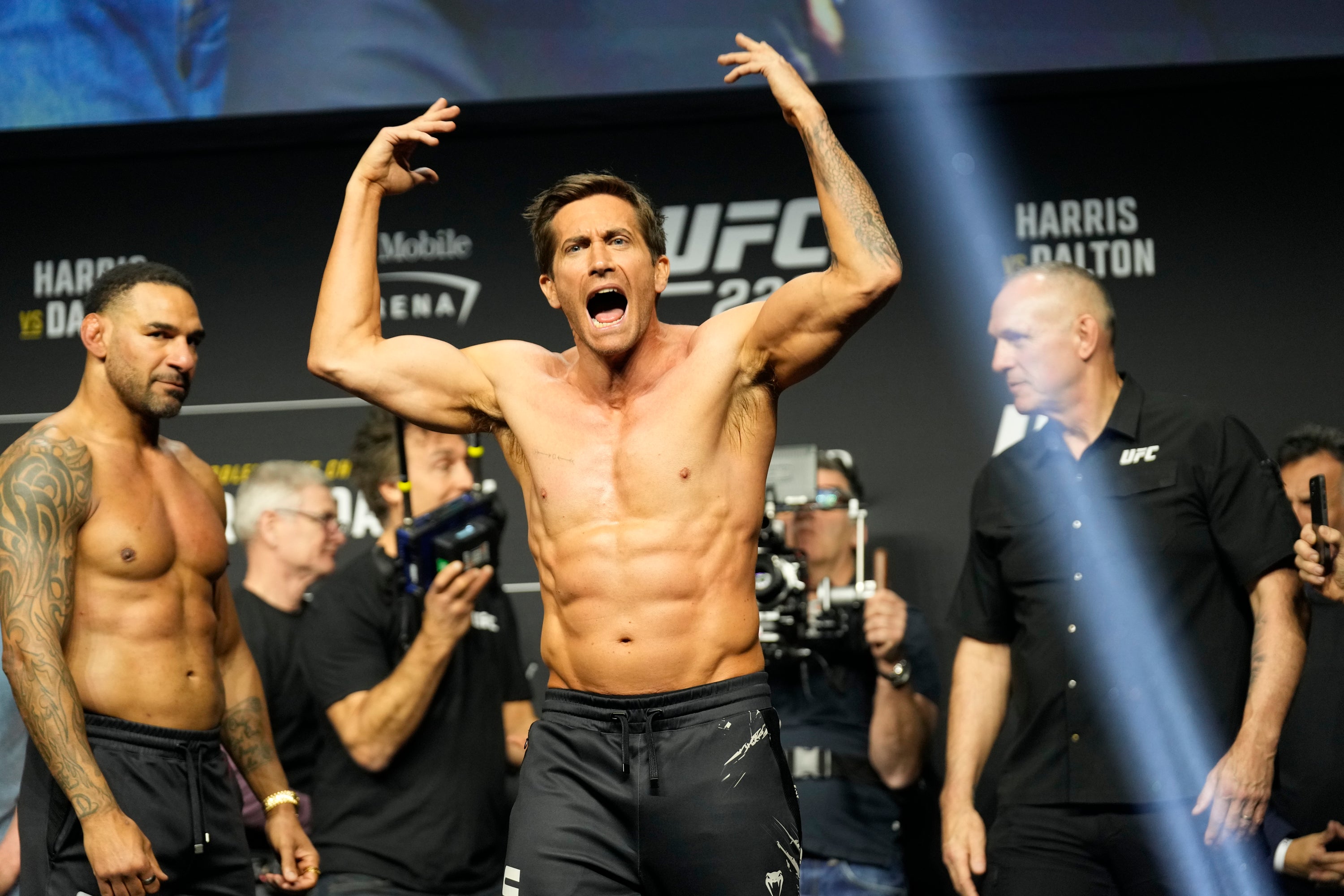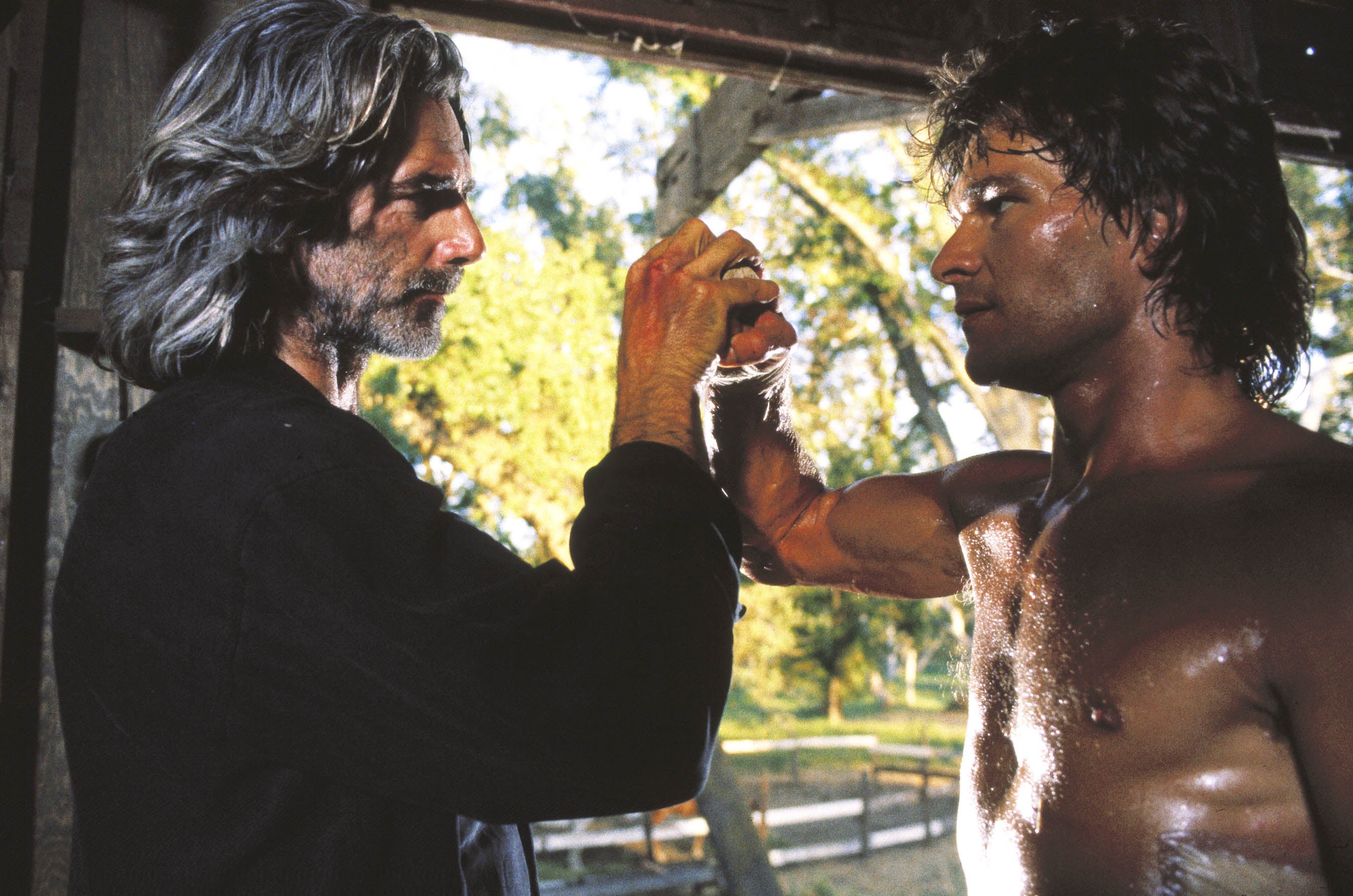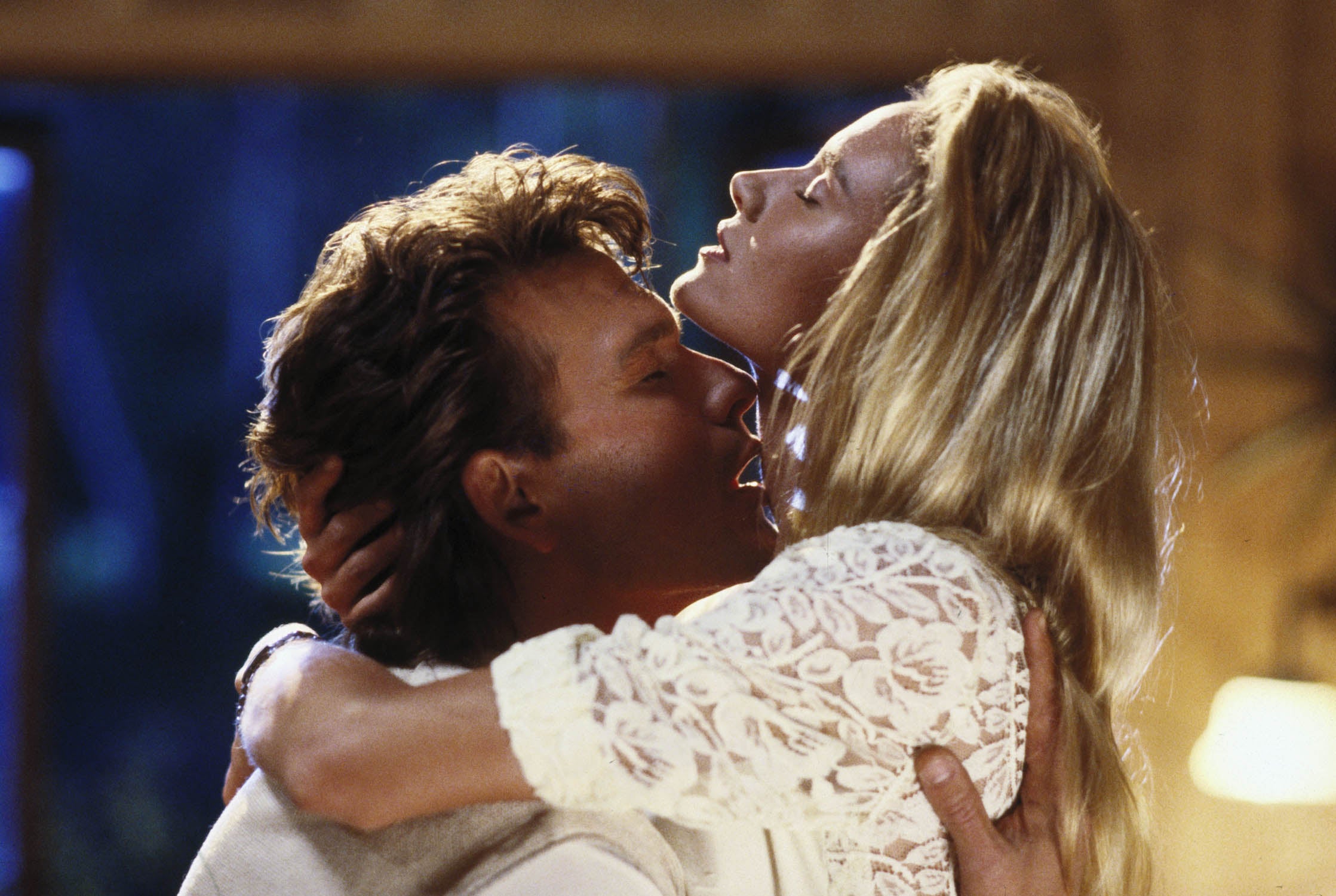Patrick Swayze’s Road House could be the best worst movie of all time – who’d be mad enough to remake it?
With its gratuitous nudity and outrageous violence, the original ‘Road House’ was dismissed as ‘vile’, ‘stupid’ and ‘sleazy’ on its release. The new remake is a perplexing proposition, writes Geoffrey Macnab, but with a beefcake Jake Gyllenhaal in the lead role, it’s got a fighting chance of being a hit

You’ll know the story already. A mysterious drifter rides into the valley. A cattle baron terrorises the local people. The drifter stands up to the villain and his henchmen. It’s a tale that’s been told and retold endlessly down the years, the framework of countless westerns and samurai films. In 1989, Road House offered its own idiosyncratically Eighties spin on this old formula. Instead of the traditional cowboy hero, it has a bouncer (Patrick Swayze) as its protagonist. He rolls into town in a battered old Buick (which he promptly swaps out for a much sleeker Mercedes). As a premise, it’s a winning one, familiar to anyone who’s seen Shane or A Fistful of Dollars. But for all the love Road House has received, it’s also met its fair share of ridicule.
“Boobs and bombs” was how producer Joel Silver (whose other credits include Die Hard and The Matrix) summed up the movie. It was indeed a very strange mishmash. Road House was filmed by its journeyman director Rowdy Herrington in the style of a glorified MTV music video or an Eighties crime series episode – but with some extra nudity thrown in. (This includes fleeting shots of Swayze’s buttocks and scenes in which venal husbands offer local drunks the chance to kiss their wives’ breasts at $20 a pop – or $10 each.) Moments of extreme violence are interlaced with incongruous scenes of Zen-like mysticism. Road House ended up receiving five Razzie nominations for worst film of the year, including Worst Picture and Worst Actor (for Swayze).
Even the film’s champions acknowledge it’s a quintessential Eighties artefact. The cheesy sex scenes. The big hair. The pumped-up rock music (much of it courtesy of blind Canadian bluesman Jeff Healey playing behind a wire fence as beer bottles rain down). It is a very long way removed from today. That is why on paper it seems so strange that Bourne Identity director Doug Liman is looking to reinvent the movie for modern-day audiences. His remake, starring Jake Gyllenhaal in the lead role, will be out on Prime Video in March. But modernising such a towering example of the daft, outdated excesses of 1980s genre cinema may be a battle that even Swayze’s pugilist would lose.
In the remake, Gyllenhaal plays a former UFC champ who takes a job as head bouncer at a raucously violent bar in the Florida Keys. To the disappointment of many fans of the original, the actor hasn’t done a Swayze and grown a proper mullet. (In the snippets of footage available in promos, he is close-cropped.) But Gyllenhaal otherwise went full Method in his preparations for playing the bouncer. “[It’s] the most ripped he’s been ... so shredded that even his muscles have muscles,” Entertainment Weekly enthused after Gyllenhaal turned up at a real UFC event in Las Vegas to shoot a fight scene.
When the remake was first announced in 2015, former UFC champ Ronda Rousey (who has appeared in action movies The Expendables 3 and Furious 7) was due to play the lead. She dropped out, but another UFC legend, flamboyant and mischievous Irish ex-fighter Conor McGregor, makes his screen debut in the movie instead. McGregor may be a good fit for Road House, but Liman and Gyllenhaal are surprising choices for such a project. Neither is associated with the “boobs and bombs” of exploitation flicks.
Gyllenhaal is a Bafta-winning star and character actor best known for intense, moody turns in films such as Ang Lee’s Brokeback Mountain (2005), Richard Kelly’s Donnie Darko (2001), and Tom Ford’s Nocturnal Animals (2016). Liman is partnering with Tom Cruise on a much-hyped new movie set in space and backed by both Elon Musk and Nasa – although it is yet to be seen if this project will ever achieve full lift-off. In the meantime, he is expected to direct Bridgerton’s Regé-Jean Page in a reboot of 007-esque spy thriller The Saint, based on the Leslie Charteris novels that also inspired the 1960s Roger Moore TV series and the 1997 Val Kilmer film.
Despite these two steady industry hands, the Road House reboot had a troubled gestation. The US trade press reported in November that producer Silver had been fired by Amazon, allegedly for “being verbally abusive to two female executives”. There was a counternarrative among the reports that suggested he had been removed from the production for raising concerns about the studio potentially using AI to finish the film during the recent actors’ strike. Whatever the case, Road House isn’t getting a proper cinema release, and will instead go straight to streaming. Expectations are far from high.

Then again, the original Road House started off as an underdog movie, too. Many early reviews were withering. The New York Times described it as “vile,” “stupid” and “sleazy”. Variety dismissed it as a “star vehicle shackled by a couple of flat tires in the script department ... ill-conceived and unevenly executed”.
More perceptive critics realised that Road House wasn’t just another pumped-up action picture. It was wondrously odd, perched, as Roger Ebert put it, “on the edge between the “good-bad movie and the merely bad”. It was never quite clear whether Road House was tongue in cheek or intended to be taken seriously – and this added to the strange fascination.
Was Road House a critique of mindless machismo or a celebration of male aggression? Not even Swayze seemed quite sure about that. “I’ve always wondered why it is that men go to bars to get away from their wives and kids or whatever ... and if fights don’t break out by midnight, they start fighting among themselves because there is something on their inside that they have to release,” Swayze reflected on the primal instincts that seemingly make bar-room brawls inevitable.
The cast took the story in deadly earnest. They didn’t wink at the audience or camp it up. The result was a film that was almost impossible not to enjoy
Just like Alan Ladd, the diminutive star of classic 1953 western Shane, Dalton (Swayze), the so-called “cooler”, faces continual taunts about his size. “You know, I thought you’d be... bigger,” the businessman (Kevin Tighe) who hires him to run security in a Missouri bar tells him when they first meet. Others also comment on his lack of inches. Dalton never rises to the bait. His instinct is to defuse tense situations rather than inflame them.
“I want you to be nice... until it’s time to not be nice,” he instructs the rest of the security staff in the Double Deuce.
This was Swayze’s next big picture after high-kicking romance Dirty Dancing (1987) made him into a teenage heartthrob. On the surface, it was a bizarre project for him, one whose testosterone-driven approach would risk alienating his legions of female fans. Swayze, though, was keen to establish his macho credentials. As his manager Kate Edwards noted, “he had just come off Dirty Dancing where he was this romantic guy. He wanted to flip that on its tail.”

Even so, he was very different from Eighties action stars like Chuck Norris or Sylvester Stallone. Martial arts expert Benny Urquidez, who choreographed the fight sequences, talked about Swayze’s “feline” quality; throughout the film, he moves more like a dancer than a brawler. Swayze is the object of the camera’s gaze, the one made to look beautiful in the close-ups, who always seems to be taking his shirt off.
The actor was actually drawing on his childhood memories of being bullied. “I spent so much of my younger years being beat up badly because of being in the arts, because of being a dancer and that kind of stuff, that at one point, I decided that nobody was ever going to do that to me again,” he said, explaining why he identified so closely with Dalton.
The problem, he added, was that the violence grows addictive and even pleasurable. “If you spend too much time with the rats in the cage, you become like the rats in the cage.”

Road House is full of moments so ludicrous that audiences can be forgiven for thinking they’re watching some Naked Gun-style spoof. “I don’t fly... it’s too dangerous,” Dalton, who seems scared of nothing else, timorously confides at one point.
Then there is the scene when he first meets the beautiful Dr Clay (Kelly Lynch), who staples up his latest knife wound. He carries around his medical records wherever he goes, so she knows instantly that he has already had 31 broken bones, two bullet wounds, nine puncture wounds, and four stainless steel screws. She also discovers he has a philosophy degree from New York University. “Any particular discipline?” the doctor asks. “No, not really... um, man’s search for faith, that sort of s***,” he replies.
Another eyebrow-raising detail: neither Dalton nor his grizzled old mentor Wade (Sam Elliott) ever show any after-effects from their many brawls. “Pain don’t hurt,” Dalton explains in another of the film’s most quoted lines.
At one stage, the ever-smirking villain Brad Wesley (Ben Gazzara), who has been tormenting the town, instructs his lackey to drive a monster truck with giant wheels through a car showroom, crushing every other vehicle there. Wanton mayhem ensues. It’s an example of destruction for destruction’s sake that has little to do with the plot.
“When you try to describe Road House, it doesn’t make any sense at all,” Lynch acknowledged in a recent documentary about Swayze. “Some people say, the best worst movie of all time. We were all in on the joke.”

The cast took the story in deadly earnest. They didn’t wink at the audience or camp it up. The result was a film that was almost impossible not to enjoy in spite of its silliness and extravagant macho posturing.
How do you recapture the erratic magic of the original Road House in a remake? From the outside, it looks an impossible task. That might explain why there’s been so little fanfare about the new Liman movie, and the lack of a theatrical release. But then, after all, this is Road House – and normal rules of combat don’t apply.
“Give me the biggest guy in the world; you smash his knee and he’ll drop like a stone,” Swayze famously said, explaining the secret of David beating Goliath – and of a good bouncer keeping things calm on a combustible Saturday night. As long as Liman and Gyllenhaal follow his advice, they must be in with at least a fighting chance of a hit of their own.
‘Road House’ will be released on Prime Video on 21 March
Join our commenting forum
Join thought-provoking conversations, follow other Independent readers and see their replies
Comments
Bookmark popover
Removed from bookmarks